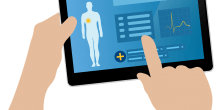First of all, let’s get something straight: patients are not getting a prescription to spray ketamine up their noses.
Ketamine is a controlled substance used as an anesthetic, most commonly on animals. It’s also been injected, mixed in drinks, snorted, or rolled up and smoked as an illicit party drug by people. Sometimes called “Special K,” when used to get high, it can make people hallucinate, and some claim to have detached, out-of-body experiences while on the drug. But it also causes increased heart rate, nausea, vomiting, numbness, amnesia, and respiratory symptoms that can lead to death. It’s often been used as a date rape drug to sedate victims.
The drug in Janssen Pharmaceutical’s (a division of Johnson & Johnson) new esketamine spray, approved by the FDA on Tuesday, is a “chemical cousin” of ketamine. Esketamine can also be abused as a hallucinogen in high doses, but the low dose in the new nasal spray has been found to possibly be effective in treating depression. However, these antidepressant properties are not yet fully understood.
While there’s been a tremendous amount of headline hype surrounding the new treatment – to be marketed under the brand name Spravato – buried within every story are key issues that indicate that it’s not the godsend that those who suffer from treatment-resistant depression might think.
For starters, this will be a labor-intensive treatment for both doctors and patients. The nasal spray must be administered in a physician’s office (patients cannot get a prescription to take home) and those who receive a dose must be monitored for at least two hours after treatment.
Most patients will need the drug administered twice a week for four weeks (with possible booster doses in between) and will also have to continue taking an oral antidepressant. All the data from the treatment must be carefully recorded at the time of treatment, and patients will not be allowed to drive on the day it is administered. Considering the labor shortage in most doctor’s offices and the time constraints many patients face, this treatment may be too burdensome for wide availability or use.
It’s also important for patients to know that this approval was fast-tracked by the FDA without the normal rigorous testing required of most drugs. The drug was designated as a breakthrough therapy in 2013, a status that expedites both the development and review of drugs for serious or life-threatening conditions. It’s known to cause side effects including (but not limited to) dizziness, nausea and vomiting, vertigo, anxiety, lethargy, high blood pressure; it can cause patients to feel intoxicated and “disconnected” from body and mind.
The FDA said that the warning material will include these risks as well as alert patients that they may feel or act suicidal and could become dependent on the drug.
One major problem with the drug being released so quickly (at least by FDA standards) is that all of the studies performed so far have been paid for and conducted by Janssen, the manufacturer – a clear conflict of interest. Of course, all drugs are trialed first by their makers, but they typically don’t hit the market until independent trials without financial influence are conducted.
Even more surprising is that Janssen’s five trials had mixed results, at best. The FDA normally requires a drug to succeed in two short-term trials before it is approved, but the agency made an exception for Spravato. Six patients died during treatment, and three from suicide. The FDA’s advisory committee said: “It is difficult to consider these deaths as drug-related.” Of course, those with severe depression can be suicidal and it’s impossible to tell to what extent the drug might have contributed to these suicides with such a small sample size.
The trials also involved starting patients on a new antidepressant drug at the same time as the nasal spray, so it’s difficult to separate the success of the standard antidepressant treatment from the esketamine treatment.
Half the patients in the trials were given esketamine while the other half were given a placebo (a typical method of testing a drug’s effectiveness). However, while one trial showed improvement on scores for a standard depression test, the other two did not show any statistically significant improvement – patients had the same results when taking the placebo.
When studying patients who relapsed during the Spravato trials, Janssen reported that one in four of those receiving the spray had another episode during the trial period vs. 45% of those who took the placebo spray – this is part of the good news.
However, it looks like the treatment may not be as effective in the elderly. Janssen’s report to the FDA noted that the treatment was less effective in people aged 65 and older. In fact, it was just barely better than a placebo.
Furthermore, there are concerns (although these are typical of any new treatment) that there is no long-term data about health effects or cognitive issues that might be caused by the drug.
Finally, new treatments are not cheap. According to CNN’s discussion with a Janssen representative, Spravato will cost “about $590 to $885 per treatment session, based on the dosage and not accounting for mandatory discounts or negotiated rebates.” Since there is no approved generic version yet, the cost will be out of pocket for most people. This is also hugely beneficial for Janssen since they will have sole control over the distribution, training of physicians, and pricing of the drug.
These aren’t impressive results, but they are an indication of just how important it is to find a new set of treatments for depression, particularly severe, long-lasting, and treatment-resistant depression that affects some people’s entire lives.
There hasn’t been a new class of antidepressant treatment in 30 years, since SSRIs hit the market. Esketamine targets different pathways in the brain than other antidepressants do, and its benefits can be felt within hours or days, as opposed to weeks or months for SSRIs.
We are still waiting for Spravato to become available following its approval. A representative from Janssen said in an e-mail to CNN that the company is “working quickly to educate and certify treatment centers on the unique administration requirements of SPRAVATOTM to ensure patients can access this important medicine.”
However, there is generic ketamine available for depression, though its use is off-label. Clinics around the U.S currently administer it as an intravenous treatment, and studies suggest that it can also help treatment-resistant people.
While we wait to see how further testing goes, we would do well to remember the hype surrounding SSRIs as well, especially Prozac, which turned out to be just that, hype. If those drugs had been even remotely as effective as marketers once claimed, we wouldn’t be so desperate for new and novel treatments.




Share Your Thoughts